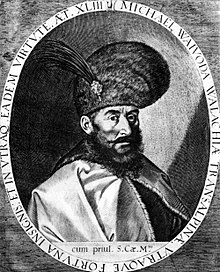| Michael the Brave Mihai Viteazul | |
|---|---|
| Prince of Wallachia Imperial governor of Transylvania Prince of Moldavia | |
 Portrait by Aegidius Sadeler II, 1601 | |
| Prince of Wallachia | |
| Reign | September 1593 – August 1601 |
| Predecessor | Alexandru cel Rău |
| Successor | Radu Mihnea |
| Prince of Transylvania (de facto) | |
| Reign | October 1599 – September 1600 |
| Predecessor | Andrew Báthory |
| Successor | Sigismund Báthory |
| Prince of Moldavia | |
| Reign | May – September 1600 |
| Predecessor | Ieremia Movilă |
| Successor | Ieremia Movilă |
| Born | Mihai Pătrașcu 15 January 1558 Târgul de Floci (near Giurgeni), Wallachia[1] |
| Died | 9 August 1601 (aged 42–43) Torda, Principality of Transylvania (now Turda, Romania) |
| Burial | 12 August 1601 |
| Spouse | Doamna Stanca |
| Issue | Nicolae Pătrașcu Domnița Florica |
| House | Drăculești |
| Father | Pătrașcu cel Bun |
| Mother | Teodora Cantacuzino |
| Religion | Orthodox Christian |
| Signature |  |
Michael the Brave (Romanian: Mihai Viteazul [miˈhaj viˈte̯azul] or Mihai Bravu [ˈbravu]; 1558 – 9 August 1601), born as Mihai Pătrașcu, was the Prince of Wallachia (as Michael II, 1593–1601), Prince of Moldavia (1600) and de facto ruler of Transylvania (1599–1600). He is considered one of Romania's greatest national heroes.[2] Since the 19th century, Michael the Brave has been regarded by Romanian nationalists as a symbol of Romanian unity,[3] as his reign marked the first time all principalities inhabited by Romanians were under the same ruler.[4]
His rule over Wallachia began in the autumn of 1593. Two years later, war with the Ottomans began, a conflict in which the Prince fought the Battle of Călugăreni, resulting in a victory against an army nearly three times the size of the army of Michael the Brave, considered one of the most important battles of his reign. Although the Wallachians emerged victorious from the battle, Michael was forced to retreat with his troops and wait for aid from his allies, Prince Sigismund Báthory of Transylvania and Holy Roman Emperor Rudolf II. The war continued until a peace finally emerged in January 1597, but this lasted for only a year and a half. Peace was again reached in late 1599, when Michael was unable to continue the war due to lack of support from his allies. In 1599, Michael won the Battle of Șelimbăr against Andrew Báthory and soon entered Gyulafehérvár (today Alba Iulia, Romania), becoming the imperial governor (i.e. de facto ruler) of Transylvania, under Habsburg suzerainty. A few months later, Michael's troops invaded Moldavia and reached its capital, Iași. The Moldavian leader Ieremia Movilă fled to Poland and Michael was declared Prince of Moldavia. During this period, Michael the Brave changed his seal to represent his personal union of Wallachia, Moldavia, and Transylvania.
The interests of the three neighbouring great powers – the Habsburg monarchy, the Ottoman Empire, and the Polish–Lithuanian Commonwealth – were damaged by Michael the Brave's achievements. Although he acknowledged the suzerainty of Rudolf II, Michael the Brave continued to negotiate his official position in Transylvania, pleading for direct rule instead of being imperial governor. Michael kept the control of all three provinces for less than a year before the Hungarian nobility of Transylvania rose against him in a series of revolts with the support of the Austrian army commanded by the Italian General Giorgio Basta, defeating Michael the Brave at the Battle of Mirăslău, forcing the prince to leave Transylvania and retreat to Wallachia with his remaining troops, while the forces of the Polish–Lithuanian Commonwealth entered Moldavia and defeated the forces loyal to Michael the Brave, restoring Ieremia Movilă on the throne. The Polish army led by Jan Zamoyski also advanced in eastern Wallachia and established Simion Movilă as ruler. Forces loyal to Michael remained only in Oltenia.

Michael the Brave then left for Prague, seeking audience with Emperor Rudolf II; however, the emperor refused to allow him audience. But General Giorgio Basta's governance of Transylvania faced significant opposition from the Hungarian nobility, leading to the reinstallation of Sigismund Báthory, who turned his back on Emperor Rudolf II and declared submission to the Polish–Lithuanian Commonwealth after receiving substantial military support. This led to Emperor Rudolf II accepting Michael the Brave's audience and providing him with 100,000 florins to rebuild his army. Meanwhile, forces loyal to Michael in Wallachia led by his son, Nicolae Pătrașcu, drove Simion Movilă out of Moldavia and prepared to reenter Transylvania. Michael the Brave, allied with Giorgio Basta, defeated the Hungarian army at the Battle of Guruslău. A few days later Basta, who sought to control Transylvania himself, assassinated Michael by order of the Habsburg Emperor Rudolf II.
- ^ "Târgul de Floci, locul unde s-a născut Mihai Viteazul". Adevărul (in Romanian). 22 July 2011.
- ^ Kemp, Arthur (2008). Jihad: Islam's 1,300 Year War Against Western Civilisation. Ostara. ISBN 978-1-4092-0502-9.
- ^ Cite error: The named reference
Britannicawas invoked but never defined (see the help page). - ^ Djuvara 2014, p. 193.